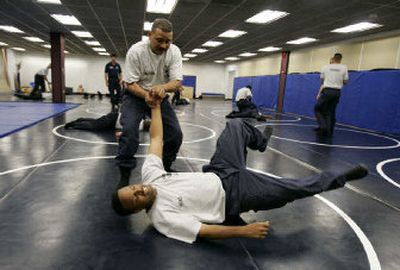Wanted: Spanish speakers

SAN JUAN, Puerto Rico — Police officers to Baltimore. Nurses to Florida. Teachers to Las Vegas.
Spanish-speaking professionals and other skilled workers are flocking to the mainland from this U.S. Caribbean territory, lured by better-paying jobs and depriving Puerto Rico of those with the most-needed skills, including doctors.
Puerto Rico has long provided a labor force for the United States, starting in the early 1900s with those who left to work on sugar and pineapple plantations in Hawaii.
But today, the outflow includes professionals recruited by U.S. organizations seeking to meet the growing demand for skilled bilingual workers.
“The migration is no longer a migration of poor peasants going to New York to pick apples,” said Eduardo Bhatia Gautier, executive director of the Puerto Rico Federal Affairs Administration. “It’s mostly professional — nurses, policemen, doctors, teachers and other service-related professionals with their families.”
Puerto Ricans have U.S. citizenship and about 1,000 from the island move to the United States every week, mostly to central Florida, according to Bhatia’s agency.
Dr. Marissel Velazquez Vicente, president of the Physicians College of Puerto Rico, attributes the talent flight to the growing Latino population in the U.S. mainland.
“Because of the growth of the Hispanic population in the United States, they are lacking (bilingual) doctors in different fields, so they are actively recruiting doctors from the island,” said Velazquez, adding that some Puerto Rican hospitals are desperately short of surgeons as a result.
Ten percent of Puerto Rico’s 9,000 doctors registered with the Physicians College — a professional group — are working in the U.S., as well as at least 5 percent of the 1,500 dentists who are members of the Dentists College, health officials said.
“This is going to get worse, unless we do something now,” said Dr. Cesar Garcia Aguirre, president of the dentists’ group.
In recent months, recruiting drives have been held by the Baltimore police, New York City schools, a Florida hospital and the Defense Department’s civil service. Salaries in the United States can be at least double those in Puerto Rico.
Many nurses who complete their studies in Puerto Rico obtain contracts for jobs on the U.S. mainland without having ever worked on the island, said Delia Morales, head of the College of Nursing Professionals of Puerto Rico.
Engineering students at the University of Puerto Rico’s Mayaguez campus have long been recruited by NASA and top corporations, said Nancy Nieves, the school’s placement director.
In Puerto Rico, those graduates would likely get lower-paying jobs. The island’s economy is stagnant. In May, the local government announced it had run out of money to pay civil servants and could only keep emergency agencies running, such as the police. More than 100,000 government workers were laid off for a few weeks.
The fiscal crisis was a windfall for the Baltimore police’s recruitment drive for bilingual officers in July. The department expected only 100 people to try out, but nearly 900 showed up, many fearing another government shutdown, said Baltimore Police Sgt. Rufino Garcia.
So far, Baltimore has hired 31 Puerto Ricans and is looking for more, Garcia said in a telephone interview from Baltimore.
Angel Santana, a 28-year veteran of the U.S. military, accepted a job offer with the Baltimore police after he was forced to take a 50 percent cut in his salary with a local freight transportation company. The company had lost business because of the temporary government shutdown.
Santana is not sure if he will return to live in Puerto Rico. Two of his sons already live and work in the United States.
“I think I am starting a new life,” the 50-year-old said.
Puerto Rican officials say there is little they can do to stop the brain drain.
“We’re trying very hard to create jobs and increase the wages in Puerto Rico, but we can’t do anything if a professional decides they want to relocate,” Bhatia said. “We do have a bilingual educated community, and money talks.”